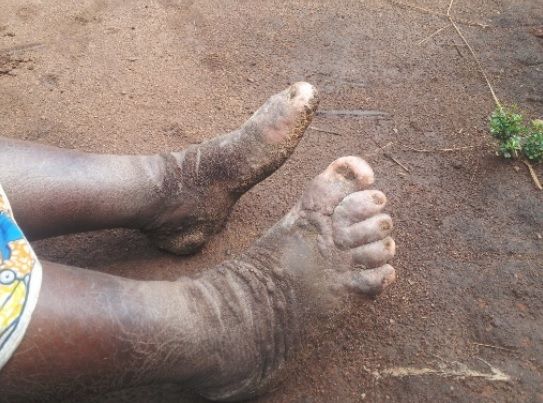
An apparent surge in elephantiasis cases in Uganda in 2015 was caused by people walking on volcanic soil barefoot, new research suggests. Over decades, tiny crystals in the soil had penetrated the skin—eventually causing the limb swelling and ulcers typically associated with the disease.
Elephantiasis is a dilapidating tropical disease that causes extreme swelling of the affected body parts. An estimated 120 million people were infected across the world in 2000, with 40 million people left disfigured, according to the World Health Organization.
Parasitic worms are responsible for most cases. When mosquitoes feed on an infected host, they ingest immature larvae that circulates in the blood. After biting a human, the larvae is deposited into the skin and enters the body and develops into an adult worm.
The cluster of cases in the Kamwenge District, western Uganda, was unusual as the area had never been known to harbor parasites that cause elephantiasis. An investigation into the apparent outbreak has now been published in the American Journal of Tropical Medicine and Hygiene.
Experts from the World Health Organization, the U.S. Centers for Disease Control and Prevention and the Ugandan Ministry of Health identified 52 suspected cases and analyzed their case reports. Findings showed no evidence of the filarial worms that cause the disease.
Instead, the team found the victims were suffering from a much rarer form of the disease, known as podoconiosis. Swelling tended to occur in victims' lower limbs, with people also suffering from skin itching, a burning sensation and ulcers.
The researchers noted that the area was largely forested up until the 1960s, when the trees and grasslands were cleared for farming. People began working on the land barefoot. The soil in volcanic regions such as Kamwenge District contains crystals that irritate the feet. After the crystals penetrate the skin, there are repeated cycles of inflammation, eventually leading to a buildup of scar tissue that blocks the lymphatic vessels—resulting in elephantiasis.
Lead author Christine Kihembo, from the Ugandan Ministry of Health, said in a statement: "People can be suffering from podoconiosis, a non-infectious disease, for decades before it becomes obvious that they are developing elephantiasis. Many of the people affected in Western Uganda probably had been suffering silently without help for more than 30 years."
Researchers said that rates had remained stable over decades because of the length of time the disease needed to develop. They said universal use of protective shoes should be recommended to prevent podoconiosis, along with education programs about foot care.
Kihembo added: "It can be a challenge to get people to focus on foot hygiene in a poor, rural community where there are many hardships, and going barefoot is not generally viewed as one of them. People end up being isolated and stigmatized by the disease and they can develop secondary infections due to the ulcers on the skin, all of which cause a further decline in their health and their ability to be productive members of the community."
Uncommon Knowledge
Newsweek is committed to challenging conventional wisdom and finding connections in the search for common ground.
Newsweek is committed to challenging conventional wisdom and finding connections in the search for common ground.
About the writer
Hannah Osborne is Nesweek's Science Editor, based in London, UK. Hannah joined Newsweek in 2017 from IBTimes UK. She is ... Read more
To read how Newsweek uses AI as a newsroom tool, Click here.








